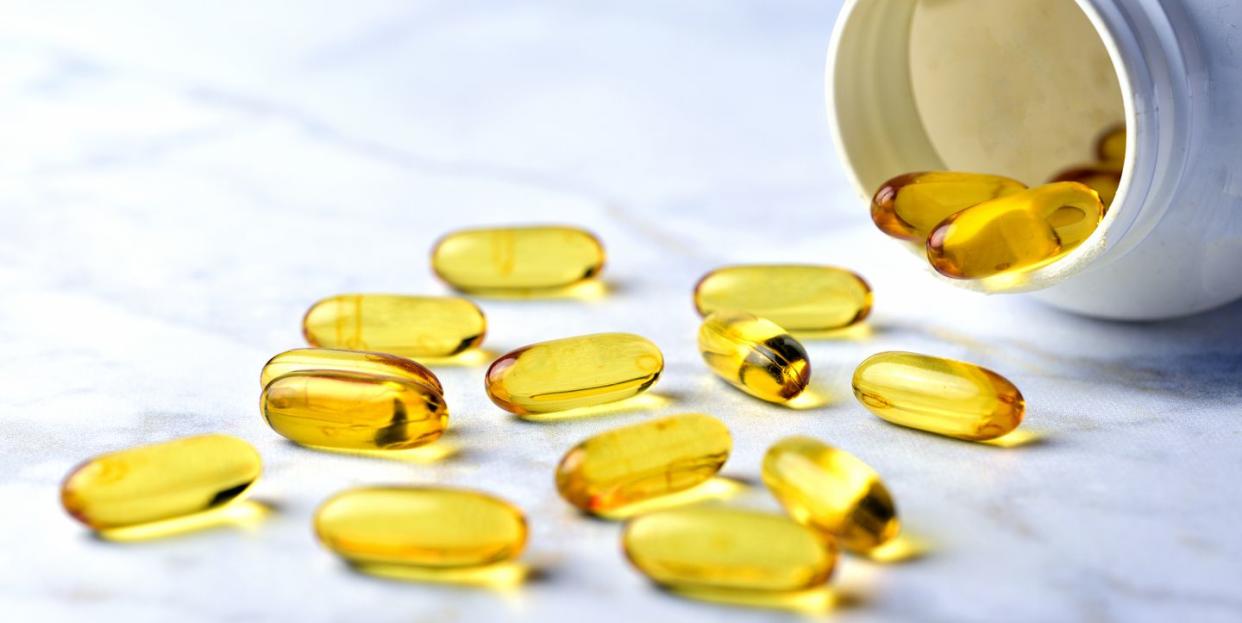You Can Boost Your Body’s Ability to Absorb Vitamin D by Improving Your Gut Health

"Hearst Magazines and Yahoo may earn commission or revenue on some items through the links below."
New research in the journal Nature Communications suggests there is a connection between how healthy your gut is and how well your body absorbs vitamin D.
If you have a healthy gut, your beneficial bacteria produce more of a substance called butyrate, which is basically the by-product made when fibers are broken down by those happy bacteria. Butyrate leads to an increase of vitamin D, so the more you have, the more vitamin D you absorb.
You can boost the amount of vitamin D you’re absorbing through healthy habits, such as eating enough colorful fruits and veggies in your diet.
Vitamin D is certainly enjoying its moment in the sun. Not only has the vitamin been highlighted lately for its potential role in COVID-19 severity, but now new research suggests it may be linked to a healthier gut microbiome—a critical part of your immune system function, hormone regulation, and bone health.
Published in the journal Nature Communications, the research looked at data from 567 men participating in a larger study on osteoporotic fracture risk.
Join Bicycling today for more nutrition tips!
Researchers used rRNA sequencing to identify the types of bacteria present in stool samples, and compared it to vitamin D levels in blood serum samples. Those researchers found that participants with more active vitamin D also had higher overall microbiome diversity—which is considered essential for better gut health.
So, what’s the connection? According to senior study author Deborah Kado, M.D., director of the Osteoporosis Clinic at UC San Diego Health, it’s all about a substance called butyrate. If you have a healthy gut, Kado said, your beneficial bacteria produce more butyrate, which is basically the by-product made when fibers are broken down by those happy bacteria. Butyrate leads to an increase of vitamin D. So, the more you have, the more D you absorb.
But here’s the catch: The word “active” is more important than it might seem, because you can be getting enough vitamin D from sunlight and supplements (the National Institutes of Health recommends 600 international units [IU] per day), but if your body isn’t metabolizing that, you won’t get the benefits the vitamin provides—such as building and maintaining bones, increasing lean body mass, boosting aerobic fitness, and improving your immune system—according to Kado.
The good news is that it’s likely you can boost how much vitamin D you’re absorbing through healthy habits, she told Runner’s World.
“It seems plausible that we can make lifestyle changes to maximize our gut bacterial health that will, in turn, help our overall health.”
In addition, as your gut function improves, your vitamin D absorption will, too.
“There are many aspects of good health that can optimize vitamin D signaling,” Kado said. “The easiest is ensuring you get plenty of fresh fruits and vegetables of many different colors in your daily diet. Not only will this provide important vitamins and minerals, but will also promote a nourishing environment for healthy gut bacteria.”
Although the study results only included older men—and Kado cannot say for certain that women and younger people would have similar outcomes—she does believe that based on previous research, it’s likely everyone would experience the same association between vitamin D and gut health.
The takeaway? Feed your gut right—and that includes regular exercise, research finds—and you’ll strengthen that vitamin D absorption.
“The health of the bacteria in our gut relate to being able to maximize vitamin D metabolism in our bodies,” Kado said, “and that’s important for a range of health benefits, including osteoporosis and immune function.”
You Might Also Like

